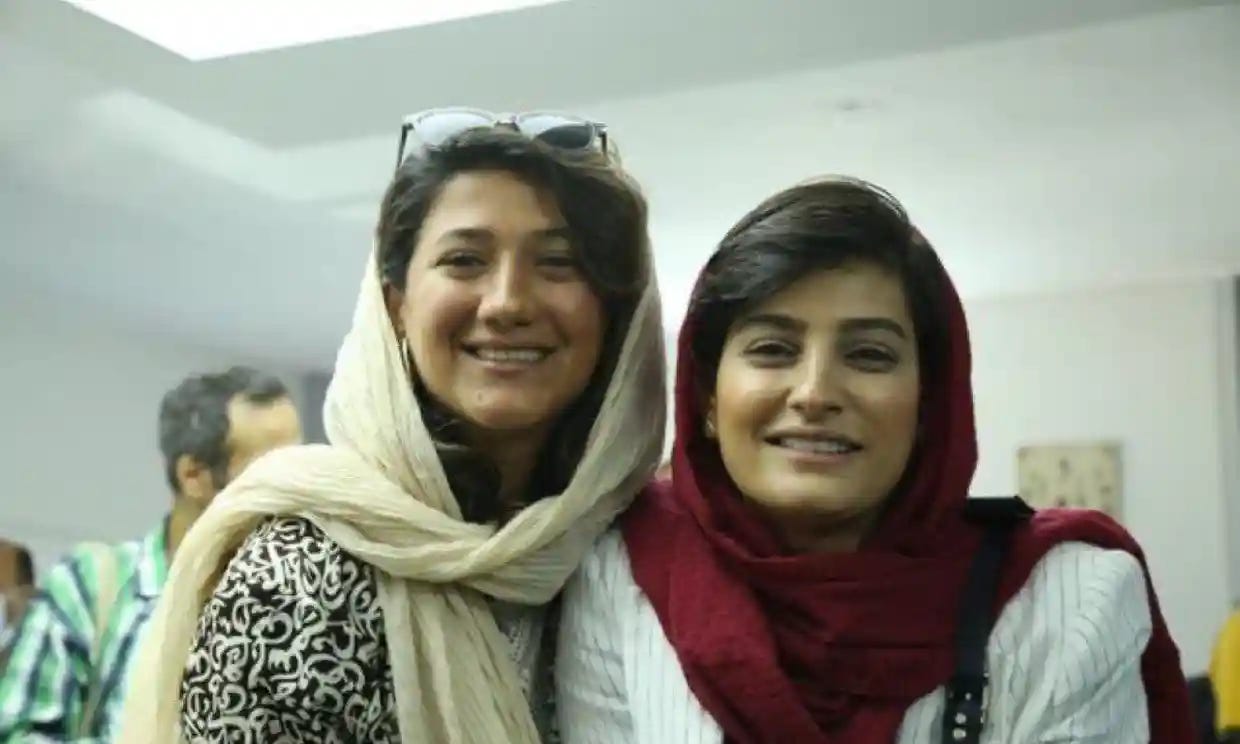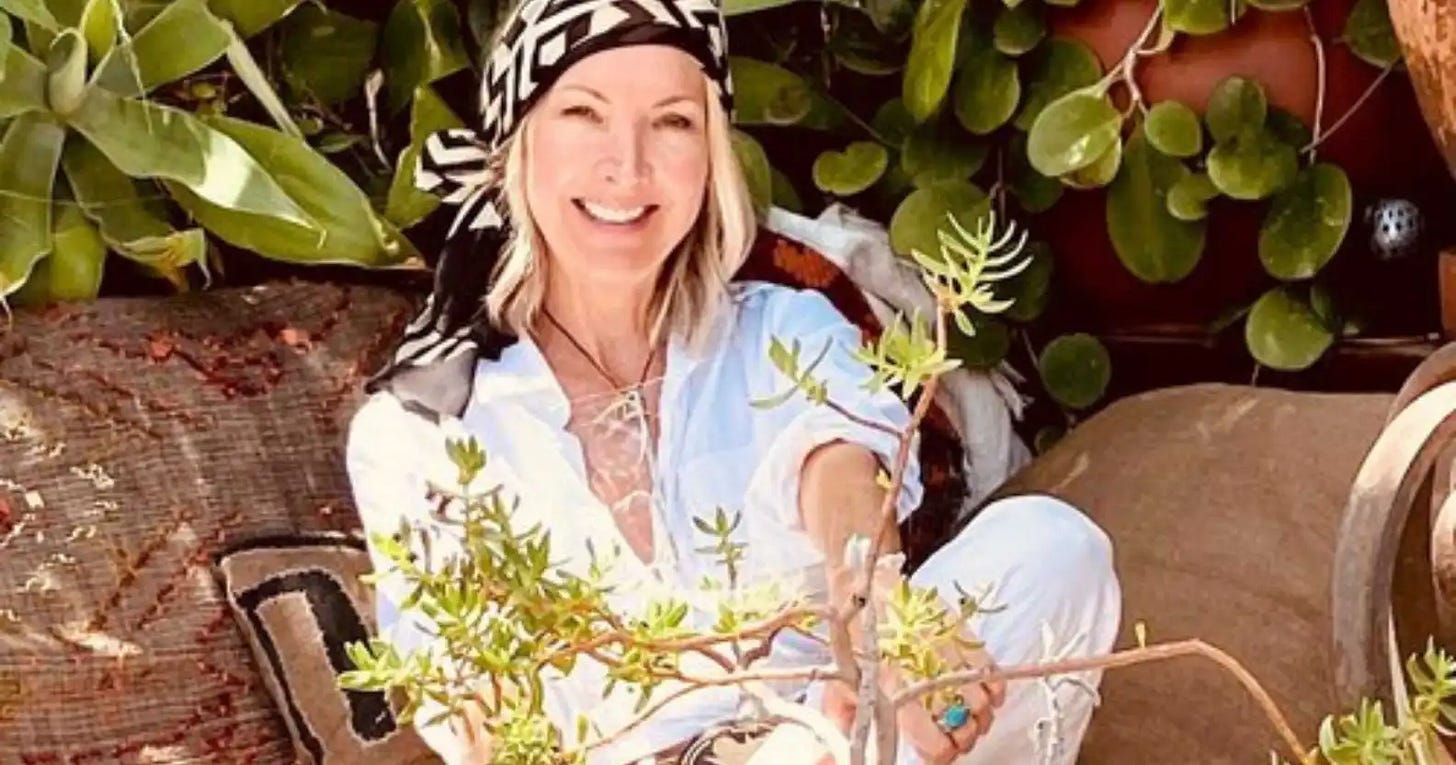Global Roundup: Iranian Journalists on Trial, Gender-Affirming Style Coach, Fighting Period Inequality in South Korea and South Africa, Middle Eastern Women’s Art Exhibition
Curated by FG Contributor Inaara Merani
Iranian journalists Niloofar Hamedi, left, and Elaheh Mohammadi are among those detained. They have been accused of orchestrating protests with the CIA. Photograph: Abaca Press/Sipa. (The Guardian)
cw: violence, death
Last year, after the death of Mahsa Jina Amini, many journalists began to document the revolutionary protests that erupted across Iran. In recent months, however, many journalists have been arrested for publishing during the protests, and most of them are women.
Two of those are Niloofar Hamedi and Elaheh Mohammadi, who are currently detained and awaiting trial this week. Hamedi works for Shargh Daily, a reformist newspaper, and Mohammadi writes for the Hammihan newspaper about gender equality and social issues. After reporting on the protests in September 2022, the two were imprisoned and held in solitary confinement. They have been accused of conspiring with hostile foreign powers, in which the punishment can be the death penalty.
Many journalists in Iran have spoken out about the violent beatings, threats, and imprisonment they have experienced at the hands of Iran’s Revolutionary Guards (IRGC). Most have been accused of working with western intelligence in orchestrating the nationwide protests.
They [IRGC agents] have messaged me several times with death threats that they will kill me, like the protesters they killed during the protests. – Anonymous female journalist
Iranian journalists have also described how much of the brutality against journalists has been focused on those whose images and reports were seen outside of Iran; out of fear of how the international public would react, the government has been punishing anonymous citizen journalists instead of major news outlets which have shared these images. As one journalist said, citizen journalists have “filled the void of official journalists who are trapped by censorship.”
I know many of them [citizen journalists] who were beaten in custody, and their legs were broken. All the videos and pictures published during the protests were from these citizen journalists, not official media. – Anonymous female journalist
As many of these women await their trials, they continue to spread messages of hope and a way forward for women in Iran.
Stylist Annaliese Cherry has supported the LGBTQ+ community by crafting gender-affirming looks for 20 years. (Supplied/Pink News)
Annaliese Cherry is a style coach who has over 20 years of experience working with the LGBTQ+ community. Rather than fashion, she focuses on enhancing people’s styles to express their identities.
Cherry launched her business, AnnalieseStyle, in San Francisco in the 2000s, and began to support the queer community. In 2016, people started to approach her for help creating looks which affirmed their gender, and her work eventually shifted into working with trans clients. She loves to support queer and trans peoples’ journeys through style. The bonds created through her styling have been deep and meaningful.
They’re trusting me so deeply. We meet up and maybe I have got a whole fitting room of clothing for them or we’re meeting at the salon for the first time. There’s that moment of transformation, where they look at themselves in the mirror and they see the possibility, or they see their true selves, and it’s pure joy. It’s why I do this work. It feeds my soul. – Annaliese Cherry
Clients work with Annaliese Cherry to find their personal style. (Supplied/Pink News)
Cherry is surprised at the lack of stylists offering gender-affirming styling. For many individuals, shopping alone or even with the help of a salesperson can be challenging. She believes that more stylists should begin offering support to queer and trans people, to help bring their identities alive through their style.
When she is not helping style her clients, Cherry offers styling lessons at LGBTQ+ centres and universities, and she holds clothing-swap parties for trans people in order to further support the community. She believes that the trans people who continue to live their lives with truth and authenticity, despite the onslaught of attacks, are warriors.
They’re next-level humans, next-level warriors of just what it is like to be so aware and having to synthesise their feelings all the time. I want to do everything I can to support, empower, uplift and create trans joy. – Annaliese Cherry
Jung Yeon-je—Getty Images. (Time Magazine)
In South Korea, a policymaker is calling on the National Assembly to implement free sanitary products for young Korean women. Representative Jang Hye-young, a member of the progressive minority Justice Party, is proposing a revision to the Youth Welfare Support Act to provide free access to menstrual products for women aged 9 to 24. She is currently looking for more support from other lawmakers in her proposal.
Having access to safe and hygienic menstruation management must be recognized as all women's rights, but Korea has long been notorious for poor actions to ensure this human rights issue. – Jang Hye-young
In Korea, sanitary products cost nearly 40 percent more than the global average. In 2016, the nation began to realize that there was a lack of universal menstrual hygiene after stories of impoverished girls who could not afford new period products went viral. An inquiry then began, and their stories prompted the passage of a 2021 law, which provides free access to menstrual products for individuals living in poverty. The calls for free menstrual products were echoed by the Korean Women Lawyers Association, which emphasized that access to these products might help with Korea’s lowest-ever birthrate.
Jang Hye-young was recently named one of Time Magazine’s Next 100, in 2021, which highlights 100 emerging leaders who are shaping the future. Jang is well-known for her efforts to support people with disabilities and the LGBTQ+ community. In January 2021, she accused her party’s chairman of sexually assaulting her, which led to his resignation. Jang said she came forward in the hopes that it would encourage other women to do so.
Tamara Magwashu wants to make sure that young women have access to sanitary pads. (BBC)
When Tamara Magwashu was a young girl, she was often bullied because her family was not rich enough to afford sanitary products. Growing up in a poor township, Duncan Village, in the Eastern Cape province of South Africa, she watched her single mother use old rags when she menstruated. Tamara would have to take around a week off of school while on her period and had to learn how to fold and use the old rags, which was uncomfortable and scarring as a child but motivated her as an adult.
I made a choice deep within me that I didn't want anyone else to go through what I did. So I had the idea to create my own company, to eradicate period poverty. – Tamara Magwashu
Now, Tamara delivers sanitary pads to hundreds of schools in the Eastern Cape. her work has been recognized by her community, and beyond, as Tamara was nominated for this year’s Forbes Magazine’s 30 under 30 list.
Growing up, she decided to get part-time jobs after school to try and help make ends meet for her family and to also help out while on her period when she could not be at school. She worked hard, but she found it difficult to understand why she was getting period pains, as she learned very little about menstruation growing up like millions of other individuals around the world experiencing period poverty.
After attending university in Johannesburg studying public relations, Tamara was able to save some money from her loans and her part-time jobs to start her own business, with the intent of helping women and girls in her community. Although it took some time to get started, she eventually launched her business in 2021 selling period products at affordable prices for women and girls living in poverty. The name of the company is “Azosule”, meaning “to wipe away every tear from their eyes” in the South African Xhosa language. She also has a charitable arm, using a portion of the company’s profits to provide free pads to schools in rural areas.
I was captivated by her work. She's advocating for the dignity of young girls and women's human rights because we don't have much. She's working towards restoring that. Despite being in that situation of poverty herself, she's trying to improve the lives of others, which is amazing - she's a walking testimony of the importance of this. – Yazini Kuse, journalist from Duncan Village
Indian Poker, artwork by Iraqi artist Hayv Kahraman, displayed in the LACMA exhibition. (Screengrab/Al Arabiya)
A recent exhibition at the Los Angeles County Museum of Art (LACMA) features the art of Arab women from the Middle East. Titled “Women Defining Women in Contemporary Art of the Middle East”, the exhibit takes visitors on a journey which explores the experiences, triumphs, and challenges of women living in the Middle East.
What curators do in museums is we acquire works, we research works, and we do special exhibitions like the one we’re standing in now. – Linda Komaroff, exhibition curator and department head
One of the featured artists is Iraqi-born and LA-based Hayv Kahraman. Her art is best known for challenging stereotypes and highlighting the resiliency and complexity of marginalized communities. Using primarily paint and watercolour, Kahraman posits women as the focus of her paintings. One of the paintings included in the exhibition, created by Kahraman, is titled “Indian Poker” which depicts two versions of a woman playing poker on a playing card.
We have four works by the Iraqi-born US-based artist Hayv Kahramen…She’s an artist whose practice really focuses on women and especially using herself as the prime figure in her painting. And if you look at her work, you’ll see that the primary figure of the woman often looks very, very much the same and is kind of a classical Iraqi beauty,” – Linda Komaroff
This LACMA exhibition showcases the diverse and dynamic ways in which women in the Middle East have historically defined themselves and each other. The exhibition is comprised of 75 works of art, with media from 42 different artists from the Middle East, and others from the diaspora communities in the US and Europe.
Inaara Merani (she/her) recently completed her Masters degree at the University of Western Ontario, studying Gender, Sexuality, and Women’s Studies with a specialization in Transitional Justice. In the upcoming years, she hopes to attend law school, focusing her career in human rights law.
Inaara is deeply passionate about dismantling patriarchal institutions to ensure women and other marginalized populations have safe and equal access to their rights. She believes in the power of knowledge and learning from others, and hopes to continue to learn from others throughout her career.







